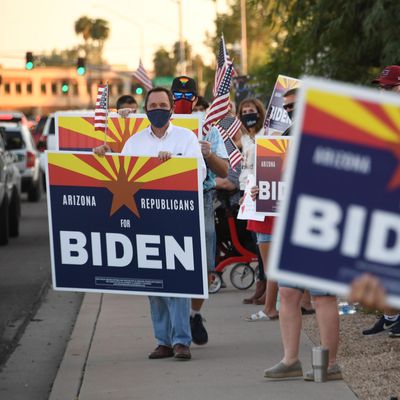
As far as demonstrations go, it wasn’t much, just three white women on the side of the road in Scottsdale, Arizona. One waved an American flag. One held nothing at all. But had Donald Trump asked God for a sign of encouragement, he couldn’t have done better than the third woman, who raised above her head a halo of red poster board on which she’d scrawled three words that, for the president and his supporters, amount to the most hopeful message of the campaign: “HUNTER’S LAPTOP MATTERS.”
If Trump is to win reelection, the three women of Scottsdale Road would have to represent an army of clones. There must exist beyond the reach of pollsters many more such voters in places like Maricopa County for whom Hunter’s laptop matters a great deal. The complex tale of Rudy Giuliani, the Democratic nominee’s son, and a device supposedly full of private photos and evidence of potential corruption or certain nepotism in Ukraine and China must outweigh in importance the pedestrian issues that tend to consume Americans as they consider the choice before them on November 3.
“I always thought it would be difficult for him,” Jeff Flake, the former senator from Arizona, told me. “Before corona and before the economy went south with the coronavirus, I thought it would be difficult.” A Goldwater Republican and devout Mormon, Flake did not get along with the president for obvious reasons. Flake sees now in Hunter’s laptop the problem that Trump’s personality poses for his party. “Boy, it’s not broadening the base,” he said.
In the four years since his narrow defeat of Hillary Clinton in Arizona, Trump has suffered among regretful white suburban voters here as he has nationwide, throwing the state into play for Democrats as it hasn’t been since Bill Clinton beat Bob Dole by 31,215 votes in 1996. “If you go to a Trump rally, that’s what gets the applause lines, gets people chanting ‘Lock him up!’ or ‘Lock her up!’” Flake said, “That’s affirmation to the president, but it’s not appealing to people that they’re trying to move. This whole campaign just seems an exercise in affirmation.”
Steve Schmidt agreed: “Trump’s coalition is in a state of collapse.” Schmidt advised the 2008 presidential campaign of the late John McCain, Goldwater’s successor as the senior senator from Arizona. More recently, Schmidt co-founded the Lincoln Project, the group formed by exiled Establishment Republicans to torment the president through brutal television advertisements. So he has plenty of reasons to root for a big Trump loss. “McCain had his enemies in Arizona for sure, but he was deeply admired in the state and reflexively, even for people who didn’t care for McCain and didn’t like him, there’s a sense of, ‘I can say that about him but you definitely can’t.’” When it comes to attacks on McCain’s valor, Schmidt said, it inspires particular “revulsion.” But on a less personal level, as a strategist, Schmidt is more awed than gleeful as he observes the reversal of Trump’s once remarkable political luck. “This is ending the only way it could end: in farcical tragedy,” he said. “All of his race-baiting and the appeals to non-college-educated white men, primarily targeted to voters in the upper Midwest where he’s behind, have turned off in profound numbers suburban women and Sun Belt voters in the New South.”
The Trump campaign’s path to a second Electoral College victory requires repeating the miracle he pulled off in 2016. Then, the race was closer and his opponent’s lead was less stable. Then, voters could think only of how he might govern or of what could go wrong, not of a pandemic yet untamed, not of jobs lost, not of 220,000 coronavirus deaths. It’s a record that no incumbent would want, that no marketing genius even of Trump’s skills could spin his way out of. Now, he must worry not only about the swing states where he barely won in 2016, including Arizona, but also about places like Texas and Iowa, where he won by almost ten points but now is just four points ahead and one point behind in polls, respectively.
With 12 days until Election Day, the polling averages suggest Joe Biden is ahead by 3.5 percentage points in Arizona — the exact margin by which Trump won the state’s 11 electoral votes four years ago. (For all the talk about the polls getting it wrong last time, it’s worth noting that here, at least, they were right in 2016. And in 2020, there’s been almost four times as much state-level polling on which to base the projections.) A senior Biden adviser recently told Politico that, if Biden wins Arizona — along with Michigan and Wisconsin, where he’s up in the polls, too — he could win the whole thing without Florida (where he’s up) or Pennsylvania (up). Though it’s possible for Republicans to win the presidency without Arizona, it’s never happened, so there’s a chance the race could be decided based on what happens here.
With that in mind, Trump held two rallies in the state on Monday, in mostly white and Republican Prescott and more Latino and Democratic Tucson. Meanwhile, the campaign dispatched Lara Trump to Maricopa County, which is where I encountered the three women and the “HUNTER’S LAPTOP MATTERS” sign. Inside a resort ballroom across the street, the president’s daughter-in-law did little to speak to the white, college-educated suburban women the campaign needs to win back and that theoretically Lara could relate to easier than Donald Trump or her brother-in-law Donald Trump Jr., who also spends time campaigning for his father. Not that any of these voters seemed to be in attendance.
If you join a mask-optional crowd of 200 people assembled indoors to see the least famous member of the Trump family on a weeknight, you likely have your mind made up already. As an example, a little old lady, wearing an American-flag-print blazer, practically leapt out of the seat a few feet in front of me to announce, “SOCIALISM SUCKS!” Still, the hope for any campaign is that a visit to a battleground state by a candidate or surrogate will generate local media coverage to reach those who wouldn’t show up to such an event. Lara’s speech was covered by the Arizona Republic, which emphasized how she mocked Joe Biden so much it was a “trend” throughout. No other outlets covered it, as far as I could tell.
“If anything, they should be sending Melania there, but that’s just my opinion,” said Representative Ruben Gallego, a Democrat who represents parts of Maricopa County. Before Congress, he was a Democratic activist and operative. He still pays careful attention to the data, and he said that things don’t look good for the president in Scottsdale. Lara Trump, due to her rhetoric and last name, is unlikely to help.
“It’s one of the highest Zip Codes of donations for Donald Trump, but also one of the areas most likely to flip against him,” he said. The polling he’s seen suggests that David Schweikert, the Republican congressman who represents other parts of Maricopa County and nearby areas, who introduced Lara onstage, “is likely to lose.” Same for the Republican candidate for state representative. As Gallego sees it, as Maricopa goes, so goes Arizona. Voters there have moderate records, and though they voted for Trump in 2016, all signs say they may not do it again, as the Latino population and the rates of Democratic voter registrations have swelled. The same year they voted for Trump, they voted out Sheriff Joe Arpaio, whom Trump pardoned in 2017.
As he sees it, demographic trends have made the state winnable for Democrats for years — it’s just that something extraordinary always seemed to prevent the investment that would secure such an outcome. Trump’s presidency has only “solidified what was already happening” in Arizona, Gallego said. “His erosion is not huge, but it’s enough to throw an election.” In 2008, Arizonans were not going to vote against McCain. In 2012, Mitt Romney “had Jeff Flake in tow” to appeal to moderates and Mormons, Gallego said. In 2016, by the time Clinton turned her attention to the state, it was too late. Although Trump “may have accelerated” things, the transformation of the suburbs from Republican to Democratic started long before his escalator ride. “Now,” Gallego said, “we’re at where we should’ve been a couple of years ago.”
Though Flake acknowledges the same demographic reality, he said, “that doesn’t explain the rejection of the president by Republicans. This is a state that Mitt Romney won just a few years ago by 12 points. This is a state Republicans should be winning.” He added that Republicans still maintain an advantage in voter registration, even if it’s growing smaller. “If you’re running, for example, for state mine inspector, if you’re a Republican, you’ll win. If no one’s paying attention to your race, just having the R beside your name is enough,” Flake said — unless “you’re a Trump acolyte and trying to justify his behavior.”
Flake believes there is no chance Trump will win a second term in office, and he accepts with resignation that Democrats are likely to assume power at all levels throughout his state, with Democrat Mark Kelly looking almost certain to defeat incumbent Republican senator Martha McSally. “Nothing focuses the mind like a big election loss,” he said. “Arizona, the president is headed to defeat. The statehouse may go Democratic. For the first time, Arizona could have two Democratic United States senators. The majority of the congressional delegation is Democratic. I hope that prompts a little introspection and a little reflection.”
After Romney’s 2012 loss, the Republican National Committee produced a study of the party’s failures and a series of prescriptions for future victory, like a softer stance on immigration that was, obviously, disregarded in the 2016 election. With Trump gone, Flake said, “we’ll basically pick up the autopsy from 2012 and dust it off.” But he added that the degree to which the party will look inward would be determined by the degree of Trump’s loss. “A massive rejection,” he said, was “the best shot we have” to change what the Republican Party has become. “There’s no future with this,” he said. “Millennials and women and minorities are running away from the party, and there are just a few aging white males like myself to keep the party afloat. We’ve got to change.”






























